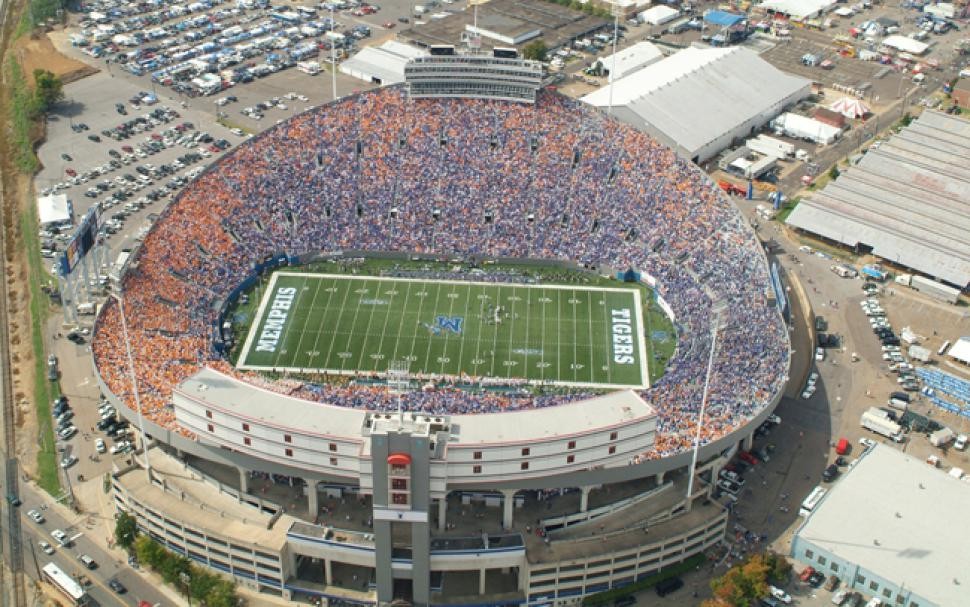The 89-page Fairgrounds redevelopment plan released this week is the third major one since 2006 so I’m taking my time digesting it.
The Looney Ricks Kiss firm did one in 2006 that, obviously, didn’t go anywhere. The RKG Associates consulting firm did a 2009 study as well as the one that came out this week. The 2009 study was pessimistic about the $125-million public/private financing proposal for a sports-oriented Tourism Development Zone. The current one is optimistic about a $233-million public/private proposal for a sports-oriented TDZ.
Same property, same qualified public use facility (Liberty Bowl Stadium), but different economy (recession then, comeback now), different mayor (Herenton then, Wharton now), different developer at risk (Henry Turley and Robert Loeb then, unnamed now), different master/enabler (a city-appointed Fairgrounds Reuse Committee then, Robert Lipscomb, head of the Division of Housing and Community Development, now) and different fate of Fairview school at the key corner of Central and East Parkway (out then, in now).
Turley’s Fair Ground plan, which I wrote about here, is not mentioned in the 2013 RKG report despite the obvious similarities. Turley got state approval for a TDZ but ran afoul of the City Council and Lipscomb, who said his fees were too high, which Turley disputed. The new plan needs state approval, and a presentation is tentatively scheduled in mid-October. After that it will also need City Council approval.
In a supporting letter, Wharton wrote that “the fairgrounds project will also serve as the central hub of the city’s family-tourism expansion through its developments at Graceland, Bass Pro at the Pyramid, and the Riverfront.” He makes no mention of the proposed Crosstown project which is less than a mile from the edge of the Fairgrounds TDZ and is seeking $15 million in public funds. The Bass Pro Pyramid is part of a separate TDZ.
In short, Memphis is betting on a whole lot more free-spending tourists coming our way.
As the name suggests, the key to a TDZ is tourism spending as opposed to local spending that would have gone somewhere else but for the new development. In a TDZ, Memphis gets to keep the incremental increase in state sales taxes above a baseline number.
The baseline number is important in determining what “new” revenue can be used to pay off the bonds. From the new report:
“The analysis by RKG Associates concludes that the projected baseline retail sales are approximately $214 million, and as a result there are ample sales tax revenues — projected at $14.3 million yearly beginning in 2016 — to support the bond payments of $11.9 million annually.”
And from the 2009 RKG report: “The estimated stream of sales tax revenue, while significant, is not necessarily new revenue. Additionally, under the assumptions of the bonding in this analysis, the projected stream of sales tax revenues is insufficient to retire $112,264,000 in bonding.”
One more negative note from the 2009 report: “By the very nature of retail there is always some degree of transferred retail sale. In the context of the Mid-South Fairgrounds, it is likely that the majority of retail sales will be transferred sales from existing merchants.”
The 400,000-square feet of “destination retail” that would bring in new money in the current fairgrounds plan is not named. Nor is the operator of the “180-room hotel/conference center.” The location would be north of Tiger Lane and south of Central Avenue. Obviously, it matters whether the retail is a destination for East Memphians or Nashvillians and Mississippians.
The report says “the Fairgrounds redevelopment is being driven by the City of Memphis as owner” and “based on the city of Memphis vision and design” the city will seek “a retail development company” for the property north of Tiger Lane and another developer/operator for the sports facilities south of Tiger Lane. There is no mention of fees.
However there is this statement:
“Using the TDZ as the vehicle for financing the Fairgrounds redevelopment and carefully calibrating a plan of redevelopment, the City of Memphis continues to build economic engines, as it has done with the redevelopment of The Pyramid into destination retail and a tourist attraction.”
Well, let’s hold that praise until after Bass Pro actually opens. As the report says elsewhere, “there is no assurance that actual events will correspond with the assumptions on which such estimates are based.”
The proposed three-square-mile Fairgrounds TDZ would include big Midtown tax generators such as the Memphis Zoo, Overton Square, Union Avenue and the soon-to-be rebuilt Kroger, and Cooper-Young. The report doesn’t flat come out and state cause and effect, but the assumption is that these things are tied somehow to the fairgrounds and the stadium and therefore their incremental tax revenues should be captured.
Again, the big question is what’s the increment? That depends on what the baseline is. The lower the baseline, the bigger the increment. In this proposal, the baseline is 2012 sales tax collections, adjusted for inflation until 2016 when the retails sales stream starts flowing to the fairgrounds bonds.
RKG’s 2013 optimism starkly contrasts with its 2009 pessimism about fairgrounds retail, which went well beyond the recession: “Approximately 80 percent of the sales that would occur at the fairgrounds would come from residents within the primary trade area. Most all of the sales activity would be reallocated sales already occurring elsewhere in Memphis.”
Fairgrounds retail, RKG said then, “would fill a void in the local market area, however it lacks highway presence and the tenant mix to be a regional consumer draw.”
That was then, this is now.

